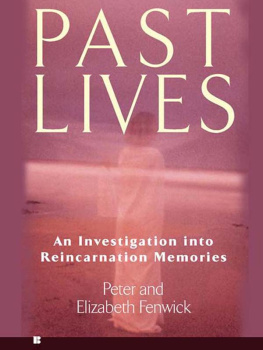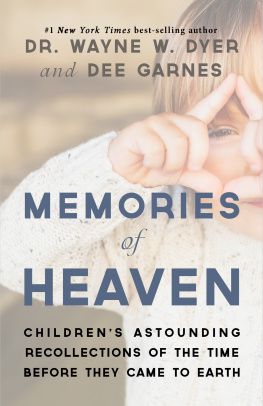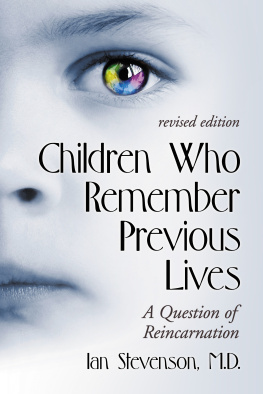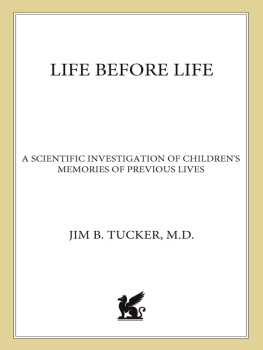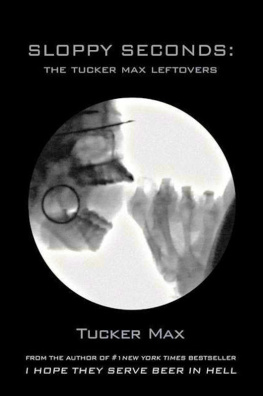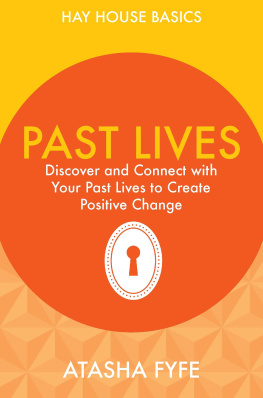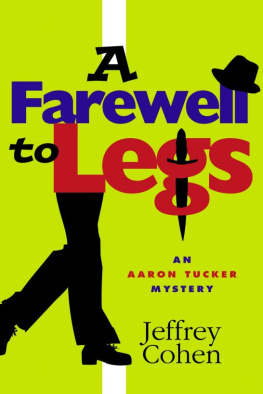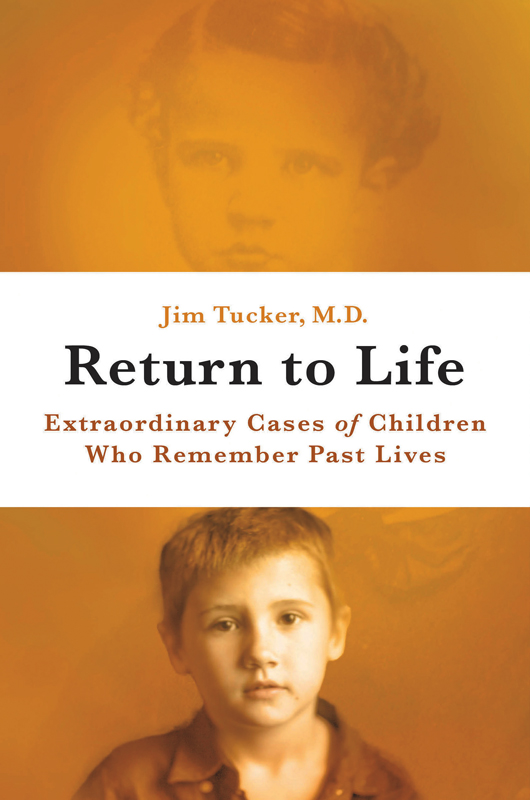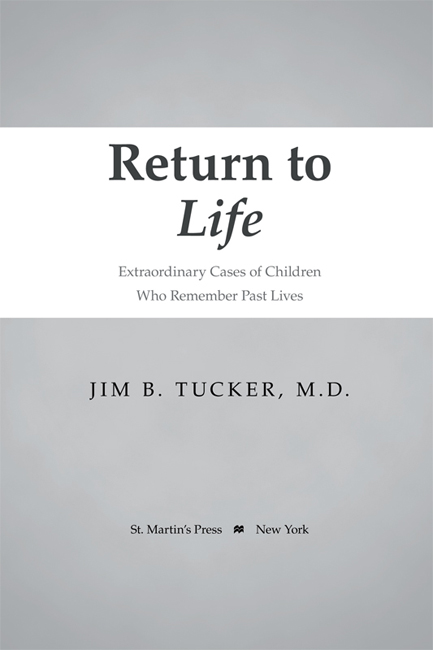
The author and publisher have provided this e-book to you for your personal use only. You may not make this e-book publicly available in any way. Copyright infringement is against the law. If you believe the copy of this e-book you are reading infringes on the authors copyright, please notify the publisher at:
us.macmillanusa.com/piracy.
*Please note that some of the links referenced in this work are no longer active.
For Ian, in memoriam
Contents
It is not more surprising to be born twice than once; everything in nature is resurrection.
VOLTAIRE
Chapter 1
A COMEBACK KID?
Patrick, a cute little boy with long dark hair and an impish smile, was my first case. He had just turned five when I met him and his family in their home, a compact house in a small Midwestern suburb. I was there accompanying Dr. Ian Stevenson. Once a young man in a hurry, becoming the head of a psychiatry department in his late thirties, Ian had walked away from the ladder of academic success for an interest he would doggedly pursue for forty yearschildren who report memories of previous lives. Nearly eighty but with curiosity still unabated, Ian was meeting the family because Patricks mother had become convinced her son was his deceased half brother returned to life.
Ian viewed Patricks case as potentially important. Though he had published many articles and books about children who had made numerous statements that matched details of someone who had died, Ians best cases were all from other countries, mostly in Asia, where a general belief in reincarnation existed. His American cases tended to be weaker. They included two basic types: children who seemed to remember being a deceased family member, and children who talked about a past life but did not give enough details for a previous person to be identified. The same-family cases had the inherent weakness that the child might have overheard others discussing the deceased. While Patricks case was a same-family one, it had another critical feature: he had three birthmarks that appeared to match lesions on his deceased half brother, marks that had nothing to do with what he might have heard people say.
Ian arranged a three-day trip with a plan to be thorough. We would have a long interview with the family on the first day, a second one the next day to cover items we had overlooked or that we needed to clarify, and interviews on the second and third days with other people involved in Patricks life. We hoped the extended time with Patrick would help him become comfortable enough to talk to us about any memories he had.
We arrived at the home and sat down in the living room with Patricks mother, Lisa. Ian took a clipboard and a tape recorder out of his satchel, well-worn from his trips around the world. He tested the recorder and placed it on the coffee table. He began by asking Lisa about her deceased son, the one whose life Patrick seemed to be remembering. Ian asked, Thats not troublesome to you, is it, to talk about that? Lisa said, No. I mean it is, but no. Where do you want me to start? Ian asked her to begin when her son first became ill, and with an even voice, she began the story.
Kevin had been born twenty years before. Lisa, a young mother, and Kevin, her first child, were doing well despite her split from his father, until Kevin began limping at sixteen months of age. This was intermittent at first, but after about three weeks he was limping all the time, and Lisa took him to his doctor. He was admitted to the hospital for three days and underwent various tests. A bone scan appeared to be normal, but x-rays showed extra fluid in his left hip joint. The doctor thought it might be infected.
Kevin was still limping when he was discharged. He fell two days later, and doctors at another hospital found he had a broken leg. They put his leg in a cast, but it caused the little boy so much pain they took it off after three days. At that point, he couldnt bear weight on the leg and refused to walk. Lisa took him to another doctor, an orthopedic surgeon. He ordered more x-rays, and these showed some destruction in two of the bones in his left leg. Kevin was again hospitalized. The doctor told Lisa he had a tumor in his leg. This difficult time was made even worse by the uncertainty of the situation. As Lisa said, they went through probably a two-week period of being told he had leukemia, that he didnt have leukemia, it went back and forth. But the upcoming news would only be worse.
Kevin was transferred to a tertiary childrens hospital to continue the workup. Along with his swollen leg, the doctors noted his left eye was bulging and bruised and he had a nodule above his right ear that might be a tumor. They suspected a neuroblastoma, a cancer that begins in nerve tissue somewhere in the body, often in the adrenal gland above one of the kidneys, and then spreads to other places. An x-ray of Kevins kidneys showed a mass at the top of his left one. A skeletal survey found various lesions and an opaque area over his bulging left eye. On his fourth day in the hospital, Kevin was taken to the operating room. The doctors took a biopsy of the nodule above his right ear and inserted a central line, a large IV, in the right side of his neck.
The biopsy confirmed the diagnosis of metastatic neuroblastoma. At least a definite diagnosis had finally been made, but it was not a good one. Kevin began treatment, getting chemotherapy through the central line. The site where the chemotherapy entered his neck became inflamed at times, but overall, he tolerated the treatment well. He also started radiation therapy that would continue after he left the hospital, including to his left eye and his left leg. After ten days, he got to go home.
Kevin seemed okay for a while. Lisa showed us pictures of him. The first one was taken before he got sick, and he is laughing, a plump baby with lots of light, curly hair. The other two are from later. They reveal a thinner, bald little boy with bruising around his left eye, which looks displaced. Too young to understand he was dying, he appears happy in both pictures, beaming in one and exploring a toy fire station in the other. They are heartbreaking.
Kevin returned to the hospital six months after his first admission. He was bleeding from his gums because the cancer had infiltrated his bone marrow and it couldnt make enough platelets. He had also developed bruising around his right eye along with the faded bruising around his left. Lisa said he was blind in the left eye at that point. His disease was considered end stage by then, meaning the little boy would die soon, but along with a platelet transfusion, he did receive one day of chemotherapy and one day of radiation to his right eye socket. He was discharged and died two days later.
Lisa talked about all of this in a calm, unemotional manner. This may have been because Ian and I focused more on the facts than any emotions. Ian did comment that she must have been very affected by Kevins death, but when she gave little response, we moved on to other matters. We were not expecting her to pour out her heart to us, and we were asking a lot just to have her recount the events of his illness and death.
Lisa carried on after Kevin died. Long separated from his father, she had started dating a new man before Kevin got sick. They married following Kevins death, and Lisa soon gave birth to a daughter, Sarah. The couple divorced after four years, and Lisa later remarried again. She had a second son, Jason, and then, twelve years after Kevin died, gave birth to Patrick by C-section. She said that as soon as the nurses handed Patrick to her, she knew that he was connected to Kevin in some way. She didnt have that feeling when her other children were born, but this birth was different somehow. Lisa said she felt empty after Kevin died, wanting him back every day. When Patrick, her new son, was brought to her, she imagined a weight being lifted as her grief for Kevin was released. While Lisa saw a physical resemblance between the two boys, there was a link that went beyond that.


